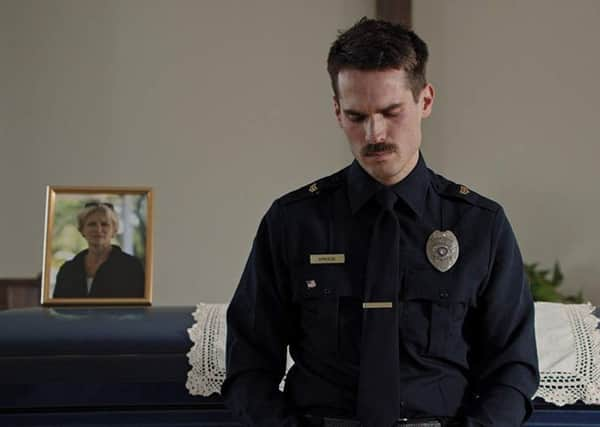Film reviews: Thunder Road | Godzilla: King of the Monsters | Ma | Sunset | Rory’s Way


Thunder Road (15) ****
Godzilla: King of the Monsters (12A) **
Ma (15) ***
Sunset (15) ****
Rory’s Way (12A) ***
Thunder Road opens with a man falling apart. At his mother’s funeral, despairing police officer Jim Arnaud (played by the film’s writer/director Jim Cummings) fails to keep it together as he attempts to deliver a eulogy involving the titular Bruce Springsteen song, a malfunctioning boom-box and an excruciating dance routine. The camera doesn’t really cut away until this squirming ordeal is over, and it’s hard not to be transfixed by the emotional car crash playing out in slow motion as Jim, blindsided by feelings he’s clearly never confronted, suddenly finds himself veering down different avenues of his complex family history as he tries to get back on track. It’s an unusual way to start a movie, but the risk pays off by foreshadowing the way this funny, heartfelt, unsentimental exploration of grief and parenthood ends up reflecting the absurd ways in which real life frequently collapses the distance between the tragic and the comic. Returning to work straight after the funeral, for instance, Jim is served with divorce papers from his estranged wife who wants sole custody of his beloved daughter (Kendal Farr) – a calamity that pushes him closer to breaking point as he attempts to settle his mother’s estate while dealing with the stresses of a job that would test the mettle of even the most zen-like person. Reminiscent of John C Reilly’s sad-sack cop in Magnolia, Cummings’ protagonist is an empathetic marvel, a decent guy trying to hold it together as the world kicks him repeatedly in the groin.
A belated sequel to Gareth Edwards’ sombre 2014 reboot of the famed Japanese monster movie franchise, Godzilla: King of the Monsters suffers from Marvel-inspired attempts create a monster-themed cinematic universe incorporating 2017’s woefully inept Kong: Skull Island and from the more pressing, though not unrelated, issue of being unforgivably dull. You’ll be thrilled to learn this is a film that requires us to remember plot details of a monster movie that didn’t exactly capture the public imagination and is now desperately trying to build on the wacky mythology introduced in the aforementioned King Kong reboot. But the film’s dullness is also down to how uninspired the action is, with co-writer/director Michael Dougherty struggling to convey the requisite sense of scale as Godzilla and Mothra go on the rampage against a host of winged and mammoth-like creatures while the human cast – Kyle Chandler, Vera Farmiga, Stranger Things star Millie Bobby Brown and Sally Hawkins among them – try not to get squished.
Advertisement
Hide AdHaving directed Octavia Spencer to an Oscar in the horribly dated racial drama The Help, director Tate Taylor re-teams with her for Ma, an enjoyably trashy exploitation shocker about a lonely middle-aged woman (Spencer) who befriends local teens and lets them party in her basement away from the prying eyes of parents and cops. Why is best not divulged in a review, but the film – the latest from Blumhouse Productions (Get Out, The Purge) – does an effective job layering in enough mystery to facilitate some unexpected jump scares and some blunt social commentary for the #MeToo age. The overblown ending lets it down, but Spencer is great as the titular matriarch gone wrong and fellow Oscar-winner Allison Janney (another alumnus from The Help) has a delicious cameo as her officious boss.
There’s more Oscar talent in Sunset, Hungarian director László Nemes’ first film since his debut, the holocaust drama Son of Saul, won the Academy Award for best foreign language feature in 2016. Though stylistically similar, it’s a very different beast, exploring as it does the last days of the Austro-Hungarian empire as experienced by a young woman hunting for clues to her family history. This is Irisz (Juli Jakab), who has returned to Budapest in 1913 to work in the hat emporium founded by the parents she lost in a fire when she was two. Learning that she has an older brother who’s gone into hiding after murdering an aristocrat five years earlier, she sets out to find him amid the chaos of Budapest as the anarchists with whom her sibling is affiliated start laying siege to the old order that Irisz’s employers and their clientele represent. Never leaving Irisz side, Nemes’ camera moves with her through the city, plunging us into the turbulence of the times, often in long single takes with no historical context and scant expository dialogue. That makes for a disorientating experience, but the cumulative effect is mesmerising, as vivid as a nightmarish dream that’s too slippery to fully comprehend but too haunting to forget.
As a curmudgeonly, Gaelic-speaking Hebridean native who travels to San Francisco to visit his estranged son (JJ Feild) and new grandson, Brian Cox makes the otherwise hokey Rory’s Way a more entertaining prospect than its groaning fish-out-of-water premise initially promises. Early scenes of the title character’s island life leave us in little doubt about the culture-and-generation-clashing jokes that will follow – and, sure enough, when he turns up at the lavish apartment of his son (a chef specialising in molecular gastronomy) and his son’s doctor wife (played by Thora Birch), it’s not long before he’s winding them up about their over-attentive parenting style. But as Rory starts bonding with his grandson and befriending locals – among them Rosanna Arquette’s museum curator and Peter Coyote’s linguist – the film settles down into a less egregiously quirky exploration of the value of making up for lost time before it’s too late.